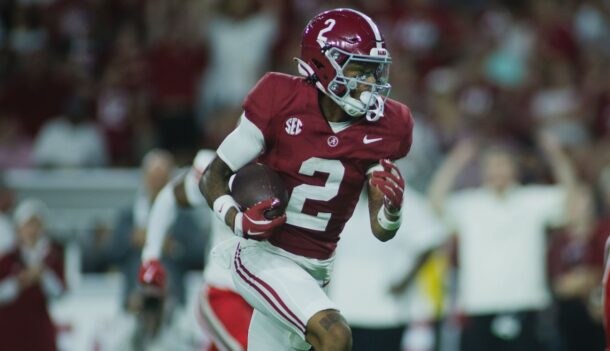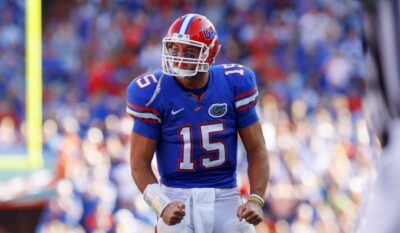How did Arkansas address its spring practice priorities?
By Ethan Levine
Published:
After snapping a 17-game SEC losing skid and earning Bret Bielema’s first bowl victory at Arkansas to cap a seven-win season, the Hogs are back and looking to rise even further in the SEC West in 2015.
With an wealth of talent returning on both sides of the ball, Arkansas is capable of making noise in college football’s toughest division, provided they remedy some of their issues from a season ago.
At the start of spring practice, we looked at what the Razorbacks should have worked to address this spring. How did they do?
1. FIND WAYS TO CREATE EXPLOSIVE PLAYS ON OFFENSE
Addressed?: Yes and no.
Arkansas’ offense looked similar in its spring game last weekend to how it’s looked throughout Bielema’s tenure in Fayetteville: an aggressive rushing attack between the tackles supplemented by a conservative, underneath passing game led by a pair of tight ends. That offense is productive when it gets in rhythm, but it’s far from explosive.
However, because the offense is consistent, it can manufacture explosive plays outside the scheme, something it couldn’t do the last two years. Senior quarterback and three-year starter Brandon Allen looked as accurate as any quarterback in the SEC (completing 17 of 21 passes on Saturday including two drops), and because he’s such a quick decision-maker and is so accurate on his throws, his receivers should have chances to create explosive plays with runs after the catch.
And considering the Hogs’ return two 1,000 yard rushers and a third tailback (a senior, no less) who ran for 174 yards and three scores last weekend, there should be plenty of opportunities to attack teams through the air. Again, these won’t be deep, aggressive throws, but the stout run game should provide Razorbacks receivers with plenty of single coverage, meaning one missed tackle could result in another 20-plus yards on a given play.
The scheme may not create many explosive plays for the Hogs this fall, but their efficiency on offense just might.
2. Turn last year’s supporting players on defense into stars
Addressed?: To be determined
The Razorbacks’ defense looked incredible over the weekend, but it was competing against the team’s second-string offense, a unit that appeared wildly overmatched throughout the spring game. The Hogs’ starting defense held its opponent to only 12 yards and no first downs on 16 first-half plays, and that would lead you to believe last year’s role players have stepped up to fill the voids left by the likes of Trey Flowers and Darius Philon.
However, because the spring game was such a mismatch, it’s tough to tell how far along some of last year’s supplementary players are in their transition to bigger roles for the fall. Defensive end JaMichael Winston, who logged only 26 tackles without a single sack a year ago, had three sacks on Saturday; Josh Harris, a freshman linebacker who redshirted a year ago, led all players with 14 tackles for the White team, meaning he logged those tackles while competing against the starting offense.
Those players and others showed flashes of what we may be able to expect this fall. However, until they do it against respectable competition by which they can be measured, it remains to be seen how far along they are in their development.
3. Find out if Jeremiah Ledbetter is the man who can replace Darius Philon
Addressed?: No
Ledbetter logged more than 20 sacks the last two years at the junior college level, and he seems like the most logical replacement for Philon with a college-ready body and some added experience compared to his competition on the depth chart. However, while Ledbetter showed flashes throughout the spring, he was relatively quiet on Saturday, recording only one tackle (it was a fairly big hit) and one quarterback hurry.
He played for the Red team, indicating he played with the first-team defense, a promising sign regarding his role for the fall. Still, he’ll need to make a much greater impact than he did on Saturday in competing against backups for much of the day. If he can’t do more against the Hogs’ second-team, it doesn’t bode well for what we can expect from him against the likes of Alabama, Auburn, LSU and others in the daunting West division.
4. Turn Brandon Allen into a playmaker
Addressed?: Yes
This may seem strange, but Allen looked so good as a game manager that he’s almost turned that role into a playmaking role. Often times playmakers are asked to win games for a team, while game managers are simply asked to not cost their team a game. Allen is still a game manager, this we know for certain (especially after Saturday), but he’s now a guy who can win games for the Hogs.
Allen never stretched the field on Saturday, but he never needed to. He was near-perfect on his throws, throwing only two incompletions that weren’t dropped among his 21 first-half attempts. He made quick decisions, got rid of the ball quickly, and led receivers to give them a chance to make plays after the catch.
He reportedly closed the spring without a single interception, which is obviously pretty incredible and a great sign for the fall. If Allen is this accurate and this commanding in the pocket come the fall, combined with the team’s top-flight rushing attack, he and the Hogs’ offense will be tough to stop. He won’t make plays, but he absolutely won’t make mistakes, and after chipping away at teams he’ll have chances to make them pay late in games.
He’s the SEC’s least exciting playmaker, but if he plays this fall like he played this spring, he deserves to be considered one.
5. Get better at situational football
Addressed?: Yes… and no.
The biggest concern surrounding Arkansas last season was its ability to play from behind or in close games with its vanilla offense. It won each of its seven games by at least 17 points, and lost four of its six games by seven points or fewer. It did not handle late-game situations in tight games well, throwing defeat-clinching picks late to lose games to top 10 foes Alabama and Mississippi State, and when it couldn’t assume an early lead it struggled mightily to play from behind due to its propensity for establishing the run, a method that eats clock like a fat kid eats cake.
The offense is just as vanilla as it was a year ago, but the entire unit is executing better than it did a year ago, which should benefit the Hogs’ when trailing or in tight games with time winding down. Allen isn’t throwing picks, and he’s finding open receivers quicker than ever before in his career. With the offense clicking, they should be able to execute better in late-game drives, as indicated by its touchdown in the two-minute offense late in Saturday’s spring game.
However, it’s still not built to play from behind. Those short passes, no matter how quick Allen makes a decision or how accurate he is with his throws, is not built to gain chunks of yards in a hurry. It’s meant to wear defenses down, methodically moving the ball five or six yards at a time to ultimately score on drives of 10 plays or more. That can be an asset, but not when trailing, especially not in the SEC. This issue did not appeared remedied this spring, which could cause trouble if Arkansas’ defense ever has a rough day (which it might after losing its two best players from a year ago).
Allen is better prepared for crunch-time situations, as is the veteran offense around him. But the Hogs are still not a team predicated on big plays, and that could hurt them in situational football depending on the opponent.
A former newspaper reporter who has roamed the southeastern United States for years covering football and eating way too many barbecue ribs, if there is such a thing.







